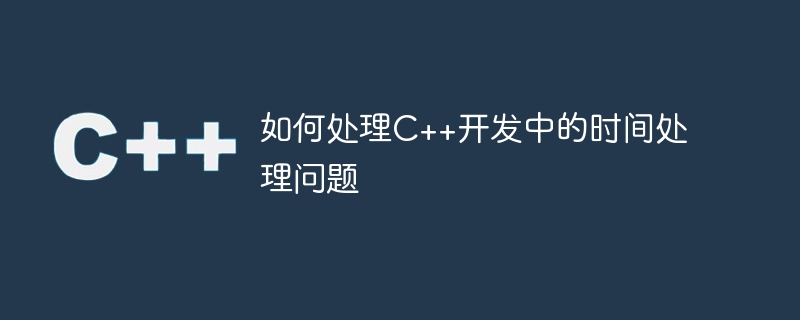Home >Backend Development >C++ >How to deal with time processing issues in C++ development
How to deal with time processing issues in C++ development
- WBOYWBOYWBOYWBOYWBOYWBOYWBOYWBOYWBOYWBOYWBOYWBOYWBOriginal
- 2023-08-22 12:55:561111browse

How to deal with time processing issues in C development
Time processing is a very important issue in software development, especially when it comes to timing, scheduling, and logging Recording and other applications. As a powerful programming language, C provides a variety of time processing methods and libraries. Using these methods and libraries in appropriate scenarios can simplify time processing work and improve the efficiency and accuracy of program development.
- Using the C standard library
C provides the standard library ctime and chrono to handle time issues. The ctime library provides some functions for processing time, such as getting the current time, formatting time, etc. The chrono library provides a set of classes and functions for processing time, including duration (time period) and time_point (time point). Use these libraries to perform operations such as time acquisition, comparison, calculation, and formatting. - Use third-party libraries
In addition to the C standard library, there are many third-party libraries that can be used to deal with timing issues, such as Boost and Qt. The Boost library provides a wealth of time processing functions and classes, including dates, time periods, time points, etc., which can meet various time processing needs. The Qt library provides classes such as QDateTime and QTime to handle time, and also provides convenient UI components to display and edit time. - Consider time zone and daylight saving time
When dealing with time issues, you need to consider time zone and daylight saving time. Both the C standard library and third-party libraries provide corresponding functions and classes to handle time zone and daylight saving time issues. When using these functions and classes, you need to set the time zone and daylight saving time information according to the specific scenario to ensure the accuracy of the time. - Using timestamp
A timestamp is a number that represents time, usually calculated from a fixed point in time. Using timestamps can simplify operations such as time comparisons and calculations. Both the C standard library and third-party libraries provide corresponding functions and classes to handle timestamps, which can convert timestamps into date and time, or convert date and time into timestamps. - Pay attention to the resolution of time
When dealing with time issues, you need to pay attention to the resolution of time. For example, if you need time accurate to the millisecond or microsecond level, you need to use the corresponding functions and classes to handle it. Both the C standard library and third-party libraries provide corresponding functions and classes to handle time at different resolutions, and developers can choose the appropriate methods and libraries according to their needs. - Error handling and exception handling
When dealing with time issues, you may encounter some abnormal situations, such as invalid time, time out of range, etc. In order to ensure the stability and reliability of the program, these abnormal situations need to be handled appropriately. You can use try-catch statements to catch and handle exceptions, or use assertions to check the validity of events. - Perform unit testing
Time processing involves many details. In order to ensure the correctness of the code, you can write corresponding unit tests to verify the time processing functions and classes. Unit testing can simulate various scenarios and test functions such as time acquisition, comparison, calculation, and formatting to ensure the correctness and stability of the code.
To sum up, dealing with time issues is a very important task in software development. In C development, you can use the C standard library and third-party libraries to handle time. At the same time, you need to pay attention to time zone and daylight saving time issues, consider time resolution, perform error handling and exception handling, and conduct corresponding unit testing. Proper use of these methods and techniques can improve the efficiency and accuracy of program development, making time processing simpler and more reliable.
The above is the detailed content of How to deal with time processing issues in C++ development. For more information, please follow other related articles on the PHP Chinese website!

